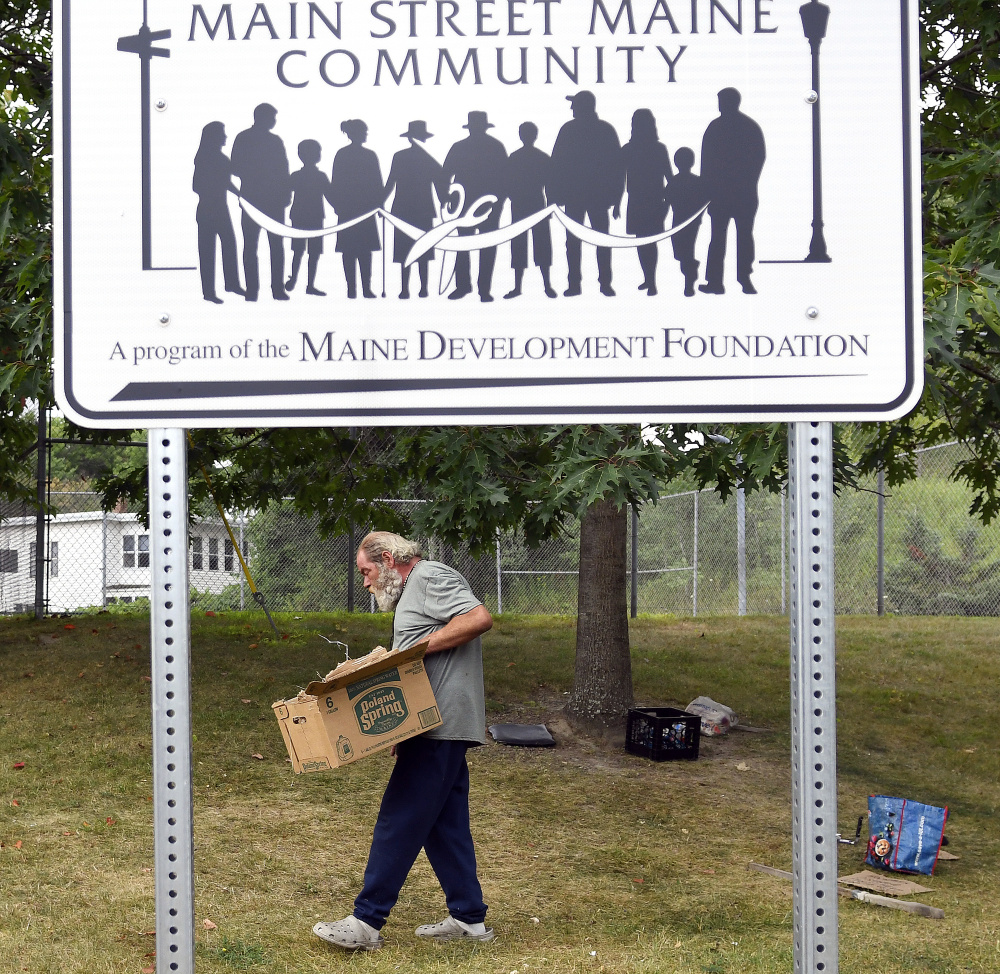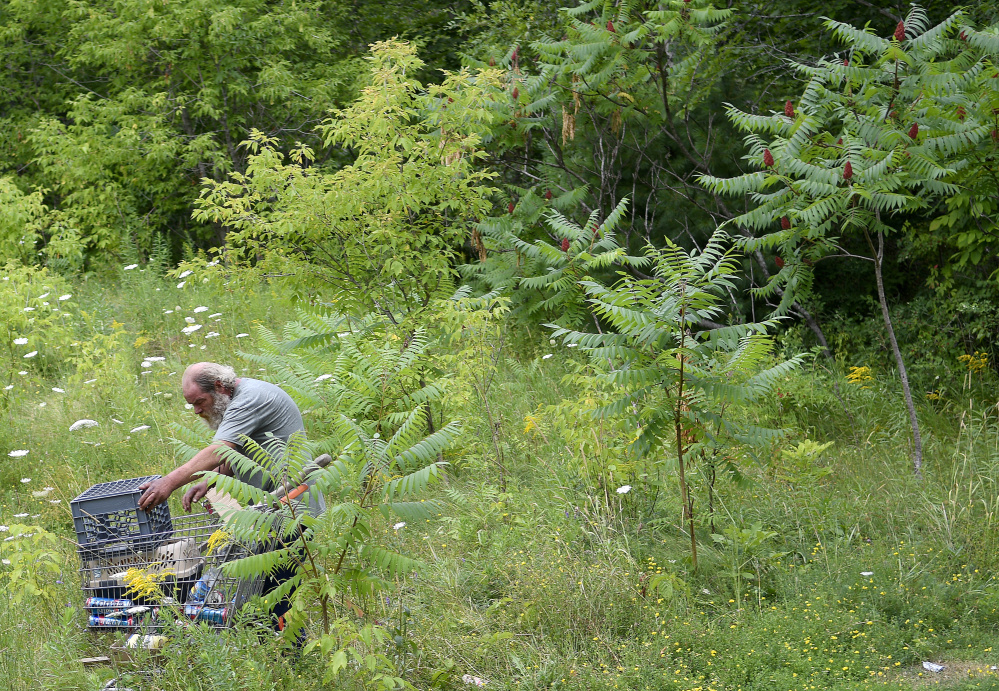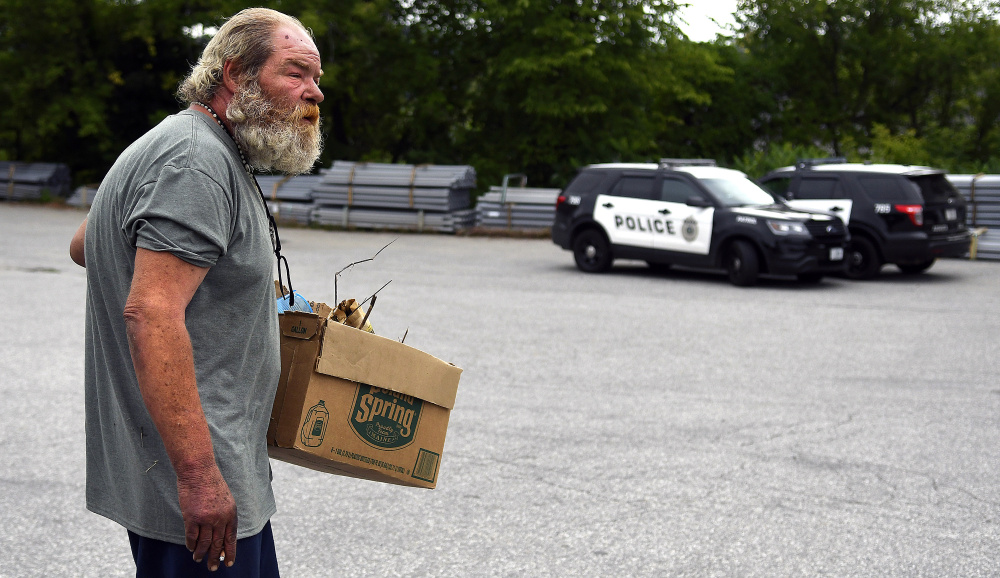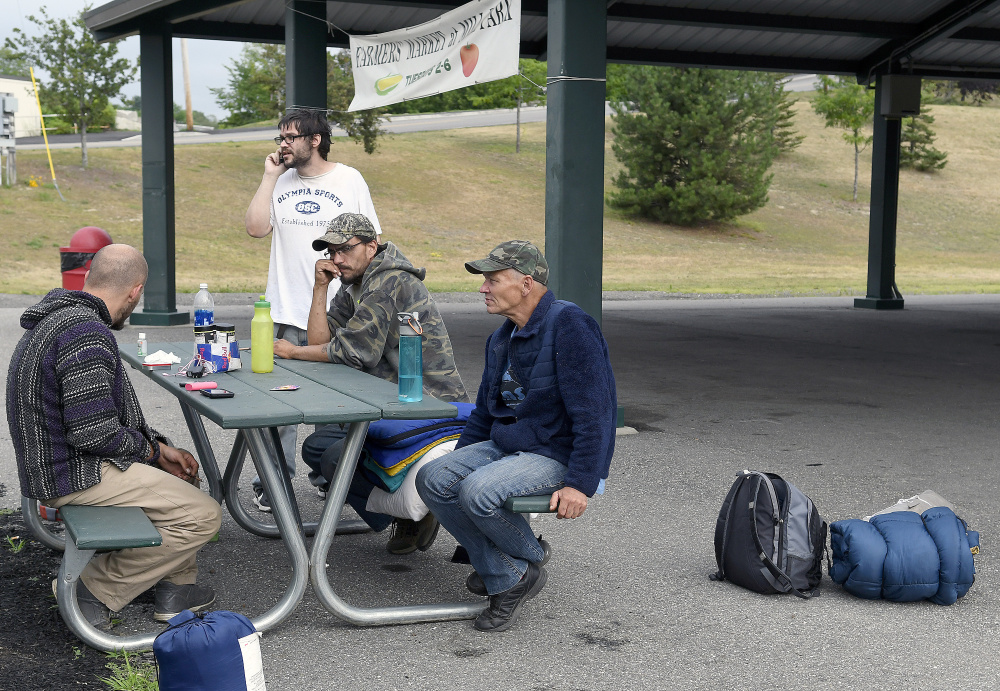AUGUSTA — Paul Merrick, homeless for the past six summers, has a number of campsites around Augusta where he lays his head at night, although increasingly, he and other people who are homeless say, he has been booted out of some of his in-town sleeping spots by police.
City officials say they’re not out actively searching the woods looking to roust homeless people from their makeshift campsites, but they have seen an increase in the prevalence of homeless camping, illegally, on public property in Augusta, and some undesirable activity taking place at and around them. And when they see it, or someone complains about it, they do indeed take action and have warned such campers they cannot stay overnight in city parks or on other public property in Augusta, or on private property unless they have the landowner’s permission.
Leif Dahlin, community services director for the city, said by the time he asked police to go and tell Merrick he had to leave his campsite on Central Maine Power Co. property abutting a city basketball court just off Mount Vernon Avenue, it was a mess, littered with trash. He said when he and police went to tell Merrick he had to leave, around 8 a.m. on a recent weekday, he was drinking a beer. Dahlin said the city also stopped using a spot near Merrick’s campsite to distribute lunches in a program that delivers free bagged lunches to children in the city, because parents had expressed concern about him being there, drinking.
“He’d been there a couple of weeks. I waited to see if he’d go away,” Dahlin said of Merrick’s campsite. “But we had to address it. We had a lunch program going on there. We’re feeding our kids and he’s there at 8 a.m. drinking big cans of beer. People felt uncomfortable.”

Paul Merrick disposes of a box of his belongings Aug. 4 after Augusta police evicted him from a campsite on public land off Mount Vernon Avenue. The homeless man said he has eight places in the city to pitch a tent.
While the 55-year-old Merrick freely admits he drinks beer in public and supports himself by panhandling, he said he’s not a threat or a nuisance to anyone.
“You get people who dislike you just because you’re homeless,” the white-bearded Merrick said on a recent afternoon while sitting on a rock alongside Mount Vernon Avenue, holding a sign declaring himself homeless and disabled, asking people for money. Beside him in the short grass were two large, empty cans of Natty Daddy, a low-price, high-alcohol beer. He said police had just stopped and made him empty out his beer, though they didn’t give him a ticket.
Merrick, who said he is a lifelong Augusta resident, said he tries to keep his campsites clean but that Dahlin and police caught him on a bad day when they came to remove him from his Mount Vernon Avenue spot. The mess, he said, was partly just some paper he had collected in boxes to make a campfire. He said they also blamed him for trash on the property that he hadn’t left, including children’s’ diapers.
He said when he gets booted from one spot, he just goes to another spot where he can camp in Augusta. He said he has as many as eight, including a spot behind a piece of plywood near Interstate 95, where he spent much of last winter, enduring 60-mph wind and snowstorms.
Police Deputy Chief Jared Mills said police have seen more homeless camping in Augusta this summer than in summers past, though beyond the weather being especially conducive to outdoor living, he’s not really sure why.
He said most of the homeless campers police interact with are among a group of 10 to 15 such people who live locally. He said when police approach them at illegal campsites to tell them they have to leave, the officers try to direct them to services in the city, including the Bread of Life’s 26-bed family homeless shelter, which takes both families and individuals.
Mills said some of them have other places they could go, but they prefer to live outside for the summer.
“If they want to go to the shelter, we offer that as an option, if there is space there,” Mills said. “But especially with the weather as nice as it is, people are electing to stay outside. It’s what they want to do.”
Merrick, a former house painter who said he can’t work because he is disabled by neuropathy, said he doesn’t want to live on the streets but he can’t afford housing, subsisting on $194 a month he gets in food stamps and the money he makes panhandling, which, he said, totals around $40 on a typical day. He said an outreach worker approached him recently and said she may be able to help him find an apartment. Merrick said he hasn’t been able to call her about that, though, because he doesn’t have a phone.
John Richardson, executive director of Bread of Life Ministries, which operates the 26-bed family homeless shelter and 12-bed veterans shelter, both on Hospital Street, and a Water Street soup kitchen that serves people in need more than 32,000 meals a year, said the shelter is almost always full.
In 2016 the shelter had 509 calls from people looking for a bed for a night whom the shelter had to turn away because it didn’t have any beds available.

Paul Merrick cleans up his campsite earlier this month on public land off Mount Vernon Avenue after Augusta police evicted him.
When a homeless person seeks to come to the shelter, but there is no space available, Richardson said shelter officials try to help in other ways, including by checking to see if there is space in out-of-town shelters, and by working directly with homeless people to see if they might qualify for programs that could put them directly into an apartment or other, longer-term housing. He said Bread of Life has 83 units of low-to-moderate-income housing where it can place some homeless people, as well as a boarding house where it rents out rooms by the week, with no security deposit.
He said the shelter, on the rare instance it has space available, does take in clients who’ve been camping in the area. He noted people sleeping outside is something that has occurred for a long time and was largely what compelled Bread of Life to open a homeless shelter in the first place.
The Bread of Life homeless shelter isn’t an option for 39-year-old Josh Graves, a registered sex offender who has been homeless for about a year and a half.
He’s spent most of this summer in a tent in the woods on public land in Augusta, moving among four or five places, including woods on the outskirts of the city’s riverfront Mill Park.
He said he keeps his campsites clean and doesn’t harass people or ask them for money. But he said the city keeps kicking him, and others, out of their campsites.
“It seems like everyplace we go we’re being kicked out, all summer,” Graves said. “It’s horrible. I hate the city. They don’t care about us. We were in the woods, out of sight, out of mind. I don’t think they need to be harassing people about it.”
Graves said as a sex offender, he’s not allowed to stay at Bread of Life’s homeless shelter.
Richardson confirmed that, saying sex offenders can’t stay there, because children are present. He said the only option for sex offenders looking for a place to stay is a couple of local landlords who’ll rent to them.
“That’s a big challenge. Bread of Life doesn’t have the resources we need to help sex offenders,” Richardson said.
Graves and three other men, who were assembled under the pavilion at Mill Park, their rolled-up sleeping bags and backpacks around them but not set up, were told by Dahlin and police they couldn’t camp overnight at Mill Park or on other city property.
Dahlin said the men denied they were camping there, though Graves and another of the men acknowledged, to a reporter and a photographer that they had been camping there.
Dahlin said the men simply were told they couldn’t camp there. He said they were not told to move along and they were welcome to stay in the park during the day, but they couldn’t stay overnight.
“It’s not a campground,” Dahlin said. “It was evident they’d been there quite a while. We reminded them they can’t camp there. What they did after that was up to them. We didn’t move them along. We just said they can’t camp there.”
Mills said police are asked by some private property owners to remove homeless people from their properties. But people also sometimes call the police to complain about apparently homeless people hanging out on public property during the day, which he said isn’t illegal.
He said police will respond to such calls but often don’t take any action, because no laws are being broken.
“Sitting there and following the rules is perfectly acceptable. We treat everybody the same. We respect everybody’s right to do that,” Mills said. “It’s when we see them breaking the law when we take enforcement action. If it’s out in the woods and not brought to our attention, we’re not likely to see it. If it is in a heavily populated area, people are going to call us. Or we’ll see it ourselves. When you see a campsite go up, we have to go in and say, ‘No, you can’t do that.'”
Richardson said Bread of Life has a long-term goal of increasing the number of beds it can offer to homeless people in Augusta, either by expanding its current shelter or finding or building a facility. He said Bread of Life had hoped to address that need by purchasing the former St. Mark’s property, but that deal was scuttled after city officials and neighbors to the St. Mark’s site expressed concerns about it.

Men discuss where to set up camp Aug. 4 after being evicted by Augusta police from Mill Park in Augusta. “They told us not to sleep here,” said Anthony Dow, left. “And we couldn’t sleep in the woods.” Police have told homeless squatters to leave several public sites across the city in the last few weeks.
Richardson said one plan, which is in its infancy and for which they have not yet started a fundraising campaign, would add 12 beds to the family homeless shelter, as well as more beds to the veterans’ shelter. He said the plan could cost about $500,000.
He said the homeless shelter works with clients who stay there to address reasons that resulted in them becoming homeless, helping them deal with drug and alcohol addiction and find employment. He said 90 percent of clients who stay at the homeless shelter don’t become homeless again after they leave the shelter.
“If you don’t help these folks, they’ll end up somewhere else needing services, and the county jail or emergency room is not what’s best suited for them,” Richardson said. “The goal, right now at Bread of Life, is to never have to turn anybody away.”
Keith Edwards — 621-5647
Send questions/comments to the editors.







Comments are no longer available on this story